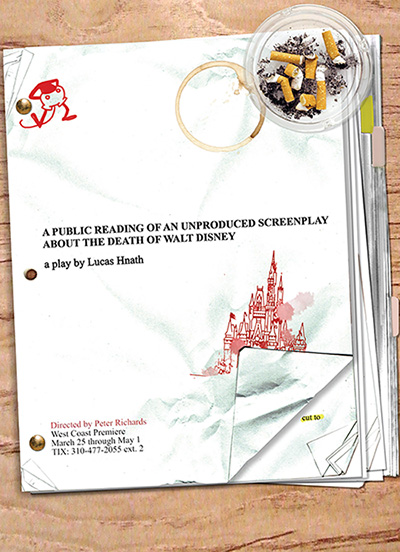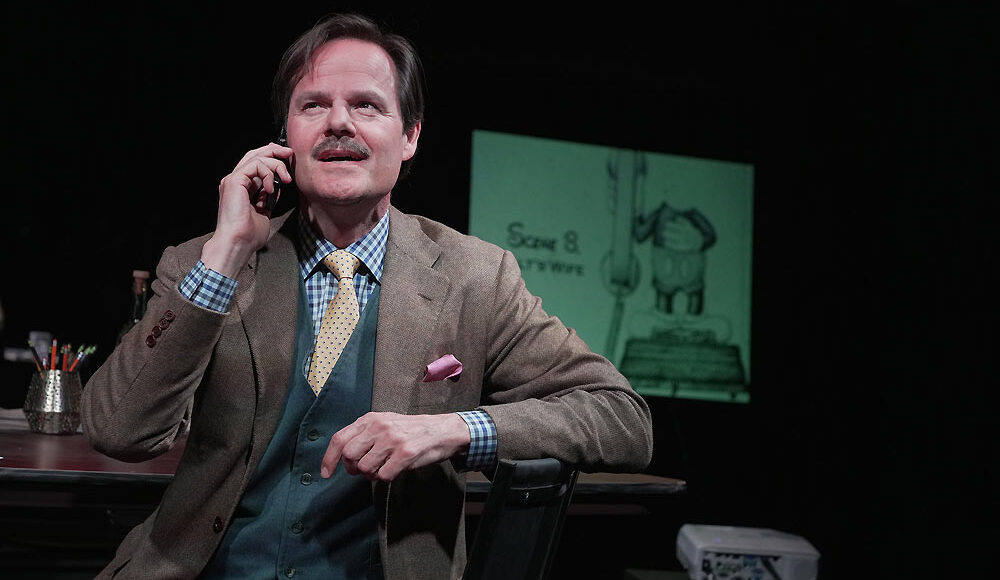By Ernest Kearney — There’s an old joke. My wife loves it.
A judge in a divorce hearing informs Mickey, “I’m sorry, Mister Mouse, but mental illness is not acceptable grounds for divorcing your wife Minnie.”
Hopping up and down in frustration Mickey shoots back, “I didn’t say she was ‘mentally ill,’ I said she was f**king Goofy!”
This serves, I feel, as a fitting segue for a review of Lucas Hnath’s A Public Reading of an Unproduced Screenplay About the Death of Walt Disney, the Theatre Planners’ visiting production running thru May 1, at the Odyssey Theatre Ensemble.
First, before getting into this strange, theatrical cocktail, —one part Jacques Derrida’s deconstructionist approach to language, two parts Brechtian stage techniques, served up with a liberal splash of audaciousness by the playwright— let’s address the title of Hnath’s 2013 play.
Now, Shakespeare liked to open his plays with the biggest hook he could: A royal ghost strutting about, ships sinking in a violent storm, otherworldly harridans converging on a battlefield, a gossipy psychopath revealing his plan to kill everybody else on stage, etcetera.
So, I give Hnath credit for plopping his “hook” smack dab in the title:
A Public Reading of an Unproduced Screenplay About the Death of Walt Disney.
The intentionally convoluted designation performs perfectly the deconstructionist’s function of equating language as a funhouse mirror, a reflection of a form that cannot be trusted for communicating truth.
In this the title accentuates and heralds the balancing act between illusion and fraud, which seems to be the core motif of this work.
“Public” (illusion – it’s only public If you can afford to buy a ticket; )
“Reading of an” (illusion/fraud – the actors are not reading/It’s a performance; )
“Unproduced” (fraud – it’s produced, we’re watching it;)
“Screenplay” (illusion/fraud – it’s a play masquerading as a script/it’s not a screenplay;)
“About the Death of” (fraud/illusion – it’s not about anyone’s death/ It is about something else;)
“Walt Disney” (illusion/fraud/myth/lie/spin/morality tale/Delphi gibberish/Cassandra’s forewarning/handwriting on wall/finger-painting on wall… Take your pick.)
The title also serves to —as the Irish would say— “prick the ear.” Reading the title, saying it aloud, forces us to engage the proverbial grey matter as its jaggedness requires some mental assembly to plumb the sense of it.
To the deconstructionists nothing can be taken in a straightforward manner; literature, history, art, is all some maze that we —like lab rats— must navigate in order to reach the cheese.
Hnath cleverly ends his maze with a tasty plebeian treat: Walt Disney.
For America of the twentieth century and beyond, Walt Disney is not a name. It is a Rorschachian ink blot of epic scale that conjures up interpretations of crippling contradictions.

A Wonderful World of Color — The Magic Kingdom — wish upon a star – Zip-a-Dee-Doo-Dah — Annette in a sweater — Khrushchev, gays, hippies and Springsteen banned from the Happiest Place On Earth —Clarabelle Cow’s inappropriate udders — Bambi’s mom shot — Dumbo’s mom tortured — Disney testifying before the House Un-American Activities Committee (HUAC) — National Enquirer headlines — the Knick Knack mermaid’s breast reduction — union busting Walt — anti-Semitic Walt — sexist Walt — racist Walt — headless Walt — and those poor Lemmings, oh the humanity!
Hnath’s play covers the most egregious of those allegations, which are also the accusations most challenged by those who knew Disney.
I imagine at this point you’re probably wondering, “Why is he writing so much about the darn title and nothing about the play?”
Well, the answer to that is simple.
I liked the title. I can’t really say I liked the play.
Walt (Kevin Ashworth), Walt’s brother Roy (Thomas Piper), his daughter (Brittney Bertier), and his son-in-law Ron Miller (Cory Washington) are gathered for the first table reading of a screenplay ‘written by’ Walt about himself.
Here in lies my trouble with this production. Director Peter Richards and producer Racquel Lehrman appear to have made one terrible choice and failed to make one essential choice.
The terrible choice was to treat the performance of this piece as an actual first reading of a screenplay. I think as anyone who has ever participated in the initial first reading of a screenplay or play will readily tell you — they suck.
Why wouldn’t they? Most first encounters do. You meet someone for the first time, you’re hesitant, guarded, uncomfortable, unsure of what to say. The same is true of any first reading. Sure, maybe after some time spent with that other person true love may bloom, and possibly once the actor gets the sense of the material, engages with their fellow cast members and determines their arcs, the screenplay may emerge as one to be ranked alongside that of Sweet Smell of Success or Chinatown.
But these things don’t spring from Zeus’ head straight out of the gate.
Director Richards has succeeded in capturing the feeling of a first reading here, and that’s not a good thing. Had he shifted the concept to the third or fourth table reading of the screenplay when the actors in their roles had had time to develop a sense of their characters and find the points of evolving conflicts he would have served the play much better.
Hell, even actors don’t like first table readings of a script, why would anyone expect an audience to?
The essential choice that seems not to have been made, concerns who it is that the script is being read by.
Is it actually Walt and family reading the script, Walt and Roy with a pair of actors, or a full quartet of actors cast in the roles?
This was vague and undefined on the stage at the Odyssey, and perhaps it’s vague and undefined in Hnath’s text, but it is a decision that certainly would have had an effect on the dynamics of the staging, and dynamics was what was lacking.
Ashworth manages to connect with the material. Piper wears a bandage on his forehead throughout the play. Whether this is supposedly the result of Walt having thrown the Academy Award at him, as is mentioned within the play, or an attempt to hearken back to that original feud between brothers and the mark of Cain is unclear. Like so much about this production, Piper, as well as Washington and Bertier are sacrificed to a lack of clarity.
As Hnath’s play is billed as a “comedy,” I kept count of the audience’s reaction to the material. On the night I attended there were 21 “rolling titters.” This is a response of mild amusement that gently rippled from among the collected theatai.
There were no eruptions of guffaws that convulsed the house, no side-splitting shrieks, no outburst of chortling until one choked, just those 21 “rolling titters.”
Call me old fashioned, but I’m of the mind that comedies should be funny. Sorry, that’s just a personal prejudice of mine.
(Featured Image Above: Kevin Ashworth as Walt Disney / Photo by Jenny Graham)
* * *
A Public Reading of an Unproduced Screenplay About the Death of Walt Disney
Remaining Performances Weekends Thru May 1:
• Fridays at 8 p.m.: April 22, April 29
• Saturdays at 8 p.m.: April 23, April 30
• Sundays at 2 p.m.: April 24, May 1
:
at
Odyssey Theatre Ensemble
2055 S. Sepulveda Blvd.
Los Angeles CA 90025
For reservations and Additional Information
go to
www.Onstage411.com/Disney






EML | April 21, 2022
|
dear skeeter, may the lord bless you and protect you, may the lord smile his face on you and be gracious to you, may the lord show you his favor and give you peace, with all my love forever, eml